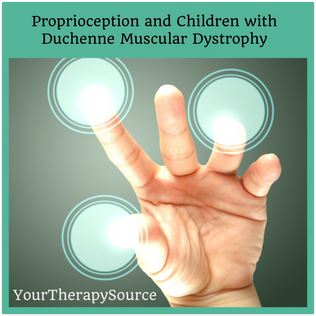Proprioception and Children with Duchenne Muscular Dystrophy
[Source: Child Development and Neurology via Your Therapy Source]

Child Development and Neurology published research on 40 makes with Duchenne Muscular Dystrophy (DMD) to examine tactile perception and manual dexterity, with or without visual feedback.
The participants were assessed for tactile perception using two-point discrimination and stereognosis tests, and manual dexterity using the Pick-Up test with the eyes either open or closed.
The results indicated the following:
1. males with DMD exhibited no impairment in tactile perception, as measured by the two-point discrimination test and the number of objects correctly named in the stereognosis test.
2. manipulation during stereognosis was statistically slower with both hands
3. manual dexterity was much worse in males with DMD when there was no visual feedback
The researchers concluded that males with DMD exhibited difficulties with manipulation during stereognosis and dexterity tests. Hand control was highly dependent on visual information rather than on tactile perception.
The researchers hypothesize that motor dysfunction in males with DMD, therefore, might be related to altered neural control.
Reference: Troise, D et al. The influence of visual and tactile perception on hand control in children with Duchenne muscular dystrophy. Developmental Medicine & Child Neurology
Volume 56, Issue 9, pages 882–887, September 2014
Please Support our Contributors and Visit Your Therapy Source.com!
PediaStaff is Hiring!
All JobsPediaStaff hires pediatric and school-based professionals nationwide for contract assignments of 2 to 12 months. We also help clinics, hospitals, schools, and home health agencies to find and hire these professionals directly. We work with Speech-Language Pathologists, Occupational and Physical Therapists, School Psychologists, and others in pediatric therapy and education.
